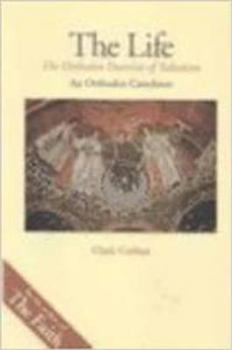Life: Orthodox Doctrine of Salvation
The Life is the fourth and last installment in Clark Carlton's catechetical Faith Series. The Life completes the series with a focus on the one thing needful: what must we do to be saved. The author... This description may be from another edition of this product.
Format:Paperback
Language:English
ISBN:1928653022
ISBN13:9781928653028
Release Date:August 2007
Publisher:Regina Orthodox Press
Length:191 Pages
Weight:0.55 lbs.
Dimensions:0.5" x 5.9" x 8.6"
Customer Reviews
2 ratings
perhaps the best concise introduction to Orthodox Christianity for Westerners
Published by Thriftbooks.com User , 17 years ago
For me, nine-tenths of the value of this book is in its chapter on Satisfactionism. Anselm of Canterbury's understanding of Christ's work of salvation, elucidated in his essay Cur Deus Homo (Why God Became Man) at almost exactly the time of the Latin See's Great Schism with the four Eastern Sees, has served as the foundation or point of departure for all Western Christian thought since that time---Roman Catholic, Protestant, Evangelical, or otherwise. Yet very few Western Christians are aware that Anselm was the first Christian theologian to promulgate the theory of Satisfactionism, so that their beliefs about Jesus Christ and His gospel are entirely dependent upon that 11th century innovation; neither are they aware that Anselm's conception was absolutely NOT the generally accepted interpretation of the Scriptures through the first millenium after Christ. Anselm's interpretation of the Christian Bible served as Christian orthodoxy for the West for the whole of the second millenium, to the point that Western Christians are generally not even vaguely aware of the manner in which the Church of the first millenium understood it. While Catholics, traditional Protestants, and American Evangelicals have been debating the details of Satisfactionism for centuries now, it has nevertheless been accepted throughout the West as the only legitimate interpretation of the Bible for the past thousand years. The Eastern Orthodox Christian Church holds Anselm's novel, latter-day theory to be heresy, and keeps to the theology of the early Church, the Church of the first millenium, the Church of the Seven Councils. Where the West has taught salvation as Satisfactionism for the past thousand years, the East has taught salvation as theosis for the past two thousand. If you wish to understand the difference between Eastern and Western Christianity (or if you wish to understand the difference between the Western Christianity of the first millenium and that of the second), Carlton's is the most concise and accessible essay I know of. He cites two excellent sources for further reading on the subject, as well: Jaroslav Pelikan and Justo A. Gonzales. The rest of the book is servicable, but there are much better treatments of most of the other topics he addresses available in different authors . Even so, four stars for the chapter on Satisfactionism.
A Primer on Orthdoxy
Published by Thriftbooks.com User , 20 years ago
My review of Carlton's other book "The Way" landed me into discussions with fellow Orthodox Christians, some of who agreed with me and a few who felt my review was negative (I'm still not sure how a 3 star rating, basically average, is entirely negative). I read this book in giving Carlton another chance (a re-reading of the "The Way" only entrenced my position).Carlton's book here is better and less polemic than the other "The Way." Further, it provides valuable information about Orthodoxy. The book does have some weaknesses. He still does not spend enough time on "theosis." This is such a central teaching that it surprises me that he does not cover it more fully; however, there are many strengths in this book. First, he does a masterfull job in expalining many Orthodox postions such as the incarnation, the Trinity, and the Creation event. The purpose of a book for catechums is to provide the faith in a nutshell, while still providng enough information for serious study and later development. This he does well. Secondly, after most sections, there is a "reflection" page with simple, but important questions that the reader or leader of the study can use to reflect on the material and more.He presents well written chapters on the structure of the church, baptism, and even monasticism should answer most inquiers' questions. Another weakness, is arguably a strength (depending on the audience). Many chapters are too short and require more depth; however, for most begginers or inquirers, the length anf explainations are probably just about right and used with supplemental material, this is a decent, although not a comprehensive tool, for inquirers about the teachings of Orthodoxy.





